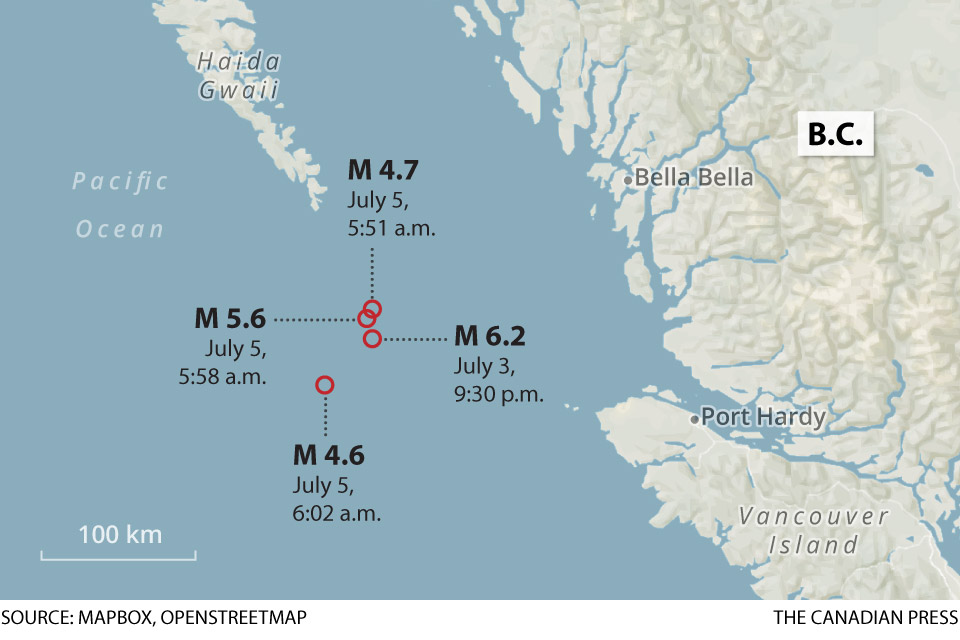The Lower Mainland
The Lower Mainland is silty specially Richmond; liquefaction will occur. Have an escape plane just in case and prepare for another big one. A fluid situation still exists between Alaska and California. Check your news stats. The magnitude in Cali has increased because there is a log jam in the plates crust..ie/The North American Plate. Pressure needs to be released but it isnt happening and this will affect the Pacific West Coast all the way up to Canada. Stay tuned!
..................................................................
B.C. earthquakes remind residents to look ahead to ‘The Big One’
A series of earthquakes have struck off the coast of B.C. since Wednesday and a major earthquake shook Southern California on Thursday, reminding West Coast residents of the years-long fear that the Pacific Northwest is due for a “Big One.”
For years, experts have warned that the region is due for a major earthquake, potentially reaching a magnitude of 9.0, killing thousands and causing waves up to 20 metres high.
“If we look back earlier in history, they were more frequent. We had something of the order of 10 or 11 prior to that, in the period that we’ve had seismometers installed,” explained John Clague, an environmental sciences expert with Simon Fraser University.
WATCH: Geophysicist says not ‘particularly concerned’ about B.C. quakes, not related to California quake
According to data from Earthquakes Canada, there are approximately 200 seismometers across Canada that are used to sense and measure earthquakes.
Earthquakes as strong as magnitude 9 strike along this fault line every 200 to 800 years, triggering giant tsunamis, according to a fact sheet from Natural Resources Canada.
The last destructive earthquake happened on Jan. 27, 1700, and experts say it is “inevitable” that another one will hit the coast. It’s predicted the quake could take place along the Cascadia Subduction Zone, a 1,000-kilometre fault line that runs from northern Vancouver Island to Northern California.
WATCH: Ground split by fissures near epicentre of Southern California earthquake
“In my world, I say, ‘Wow, we’re kind of due for one,'” Clague said.
Earthquakes are linked to the moving of tectonic plates that lie directly beneath the surface of the earth, which makes them incredibly difficult to forecast.
A 6.3-magnitude quake struck about 211 km off the coast of Bella Bella, B.C., around 9:30 p.m. on Wednesday, according to Earthquakes Canada. (The U.S. Geological Survey measured it as 6.2). Three smaller quakes occurred nearby on Friday.
Off the coast of B.C., earthquakes are not at all uncommon.
“That’s a real hotspot. It’s probably the most active little chunk of real estate in Canada as far as earthquakes go,” Clague explained.
“We’ve had about 30 earthquakes of magnitude 5 or larger in the last three or four decades in that area, and that’s just a function of the geology of that particular place beneath the ocean floor.“

In addition, Clague says it’s common for earthquakes to come in clusters, known as aftershocks.
“That’s just a result of the main shore destabilizing Earth’s crust and leading to readjustments in the form of typically smaller earthquakes, although not always smaller,” Clague said.
While a handful of aftershocks are common after a serious earthquake, Californians have experienced over 200. However, Clague notes that B.C. and California are located near different tectonic plates, meaning the events are likely unrelated.
Whether it’s the Big One or the smaller earthquakes British Columbians are used to, the provincial government has taken many steps to prepare, including retrofitting seismometers.
“We can still expect a lot of damage during earthquakes, but all this to say is we have moved forward in terms of improving our infrastructure to deal with this but, in a worst-case scenario, we can still expect a disaster,” Clague explained.
“You can never be 100 per cent prepared for these rare kinds of amazing events that Mother Nature throws at us.”


No comments:
Post a Comment
Comments always welcome!